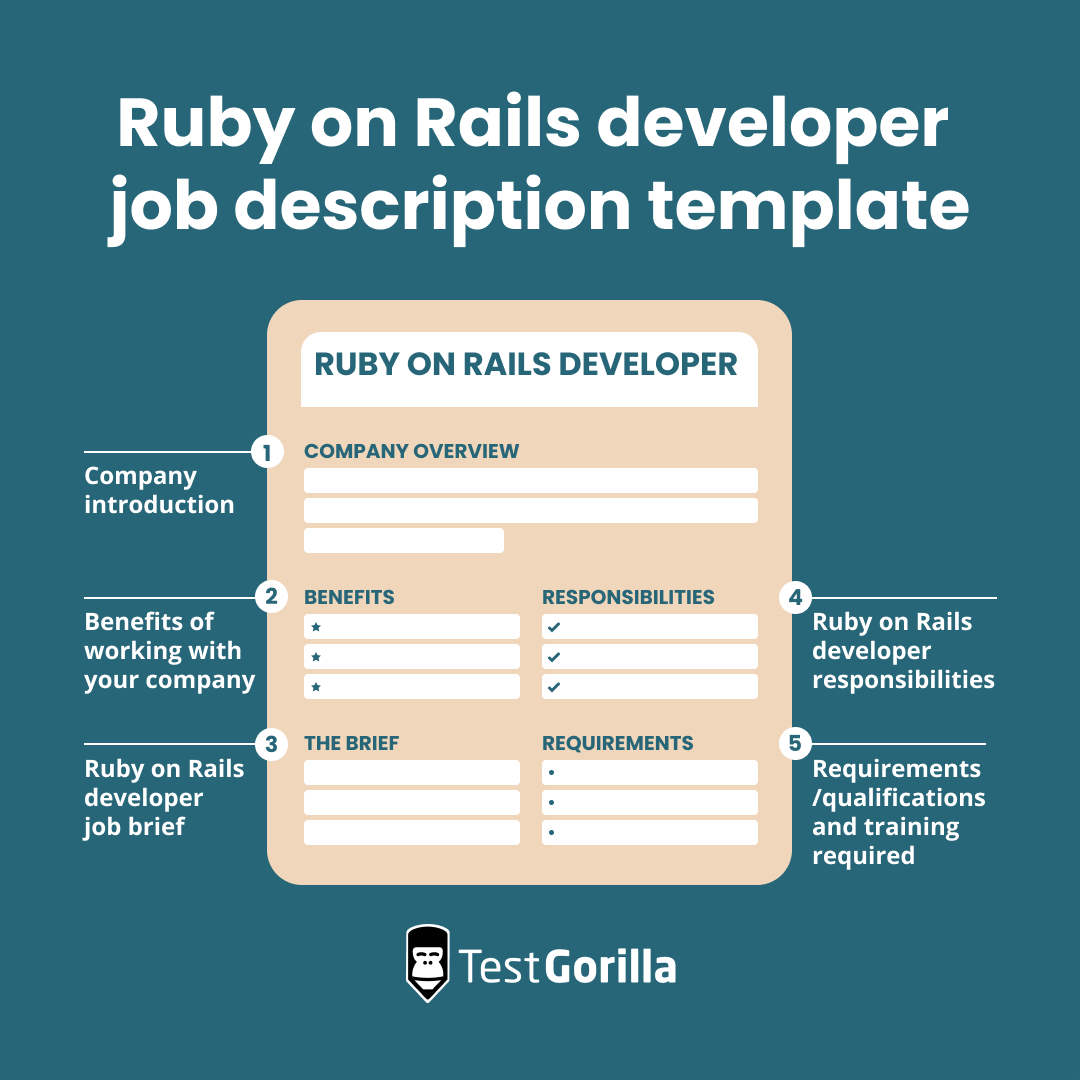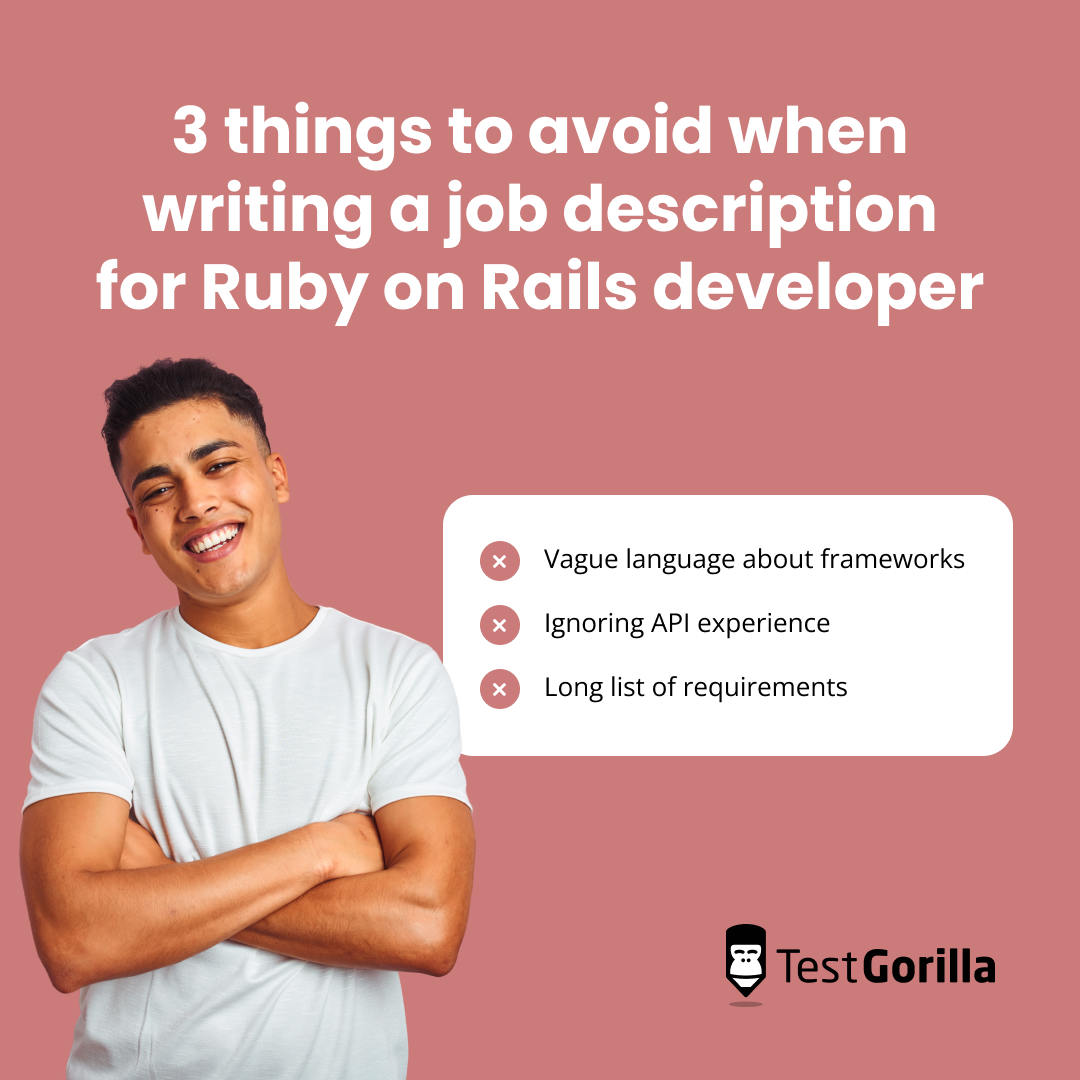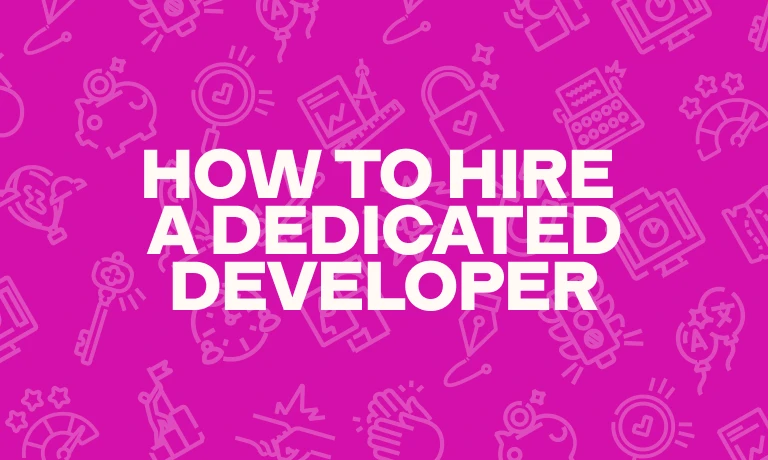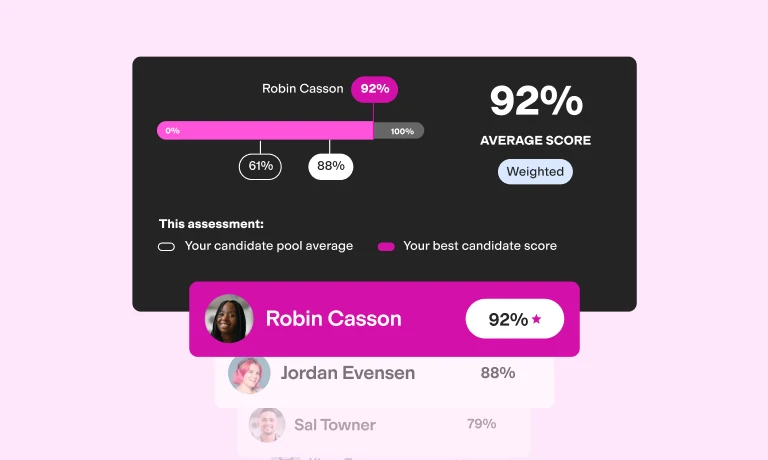Ruby on Rails developers are vital to building web applications that perform well and are easy to use – and securing the best developers starts with writing an effective job description.
Without one, you risk attracting the wrong talent and interviewing unfit candidates. You might even end up hiring candidates that don’t fit the role well, costing you in project delays and decreased productivity.
In this guide, we walk you through creating a perfect job description for your Ruby on Rails developer position – including the technical skills, soft skills, and qualifications to include. We also share a free template to make the process even easier.
Table of contents
- What is a Ruby on Rails developer?
- Key skills to look for in a Ruby on Rails developer
- How to write an effective Ruby on Rails developer job description
- Ruby on Rails developer job description template
- 3 things to avoid when writing a job description for Ruby on Rails developer
- Next steps: Attracting and assessing Ruby on Rails developer candidates
- FAQs
- Get the best Ruby on Rails developers with TestGorilla
What is a Ruby on Rails developer?
A Ruby on Rails developer is a software engineer specializing in using the Ruby on Rails framework. This framework, often abbreviated to Rails, is known for its speed and simplicity, making it a go-to for web application development.
A Ruby on Rails developer's job involves both back-end and front-end tasks, from database interaction to web page design. On the back end, developers work with databases, server logic, and application architecture to handle the behind-the-scenes functionality of a website. On the front end, they’re involved in designing and creating the user interface, ensuring that the web pages are visually appealing and user-friendly.
Key skills to look for in a Ruby on Rails developer
Ruby on Rails developers need a mixture of soft and hard skills. These include:
Technical proficiency in Ruby on Rails: This is the heart of the job, so a deep understanding of the framework is crucial.
Understanding of MVC architecture: Mastery of Model-View-Controller (MVC) principles is vital for efficient code structure.
Front-end skills: Developers should be comfortable coding in HTML, CSS, and JavaScript.
Database management: Skills in SQL and other database technologies are important for backend development.
Version control: Familiarity with tools like Git helps developers with team collaboration and code management.
Testing: The ability to write test cases and perform unit testing ensures a bug-free application.
Problem-solving: Logical and analytical thinking aids in troubleshooting and finding efficient solutions to challenges.
Communication: Strong verbal and written communication skills make for better teamwork and clearer project goals.
Adaptability: The tech world changes fast, so developers must be open to learning new tools and technologies.
The best insights on HR and recruitment, delivered to your inbox.
Biweekly updates. No spam. Unsubscribe any time.
How to write an effective Ruby on Rails developer job description
Here are five tips to remember while writing your Ruby on Rails developer job description.
Specify the version of Ruby on Rails
Make it clear which version of Ruby on Rails you're using for your project – for example, Ruby on Rails 6.0. Different versions have different features, and some developers specialize in particular ones. Knowing the version helps candidates assess if their skills align with your needs.
Highlight the development skills you need
Ruby on Rails developers often handle both front-end and back-end tasks, but your project might lean more toward one side. Or, you might seek someone who excels in full-stack development, meaning both front- and back-end development.
In your job description, specify which development skills your candidate needs: more front-end, more back-end, or full-stack. This way, potential applicants can understand whether their expertise and experience align with the role’s requirements.
Ask for experience with testing frameworks
In Ruby on Rails, testing is vital for long-term project health. Mention if you require experience with RSpec, MiniTest, or other testing frameworks specific to Ruby on Rails, as this is an important aspect often overlooked in job descriptions.
Discuss database knowledge
Ruby on Rails works seamlessly with various databases. Specify if you’re using PostgreSQL, MySQL, or SQLite. This lets candidates know if their database expertise matches your tech stack.
State required DevOps skills
In your job description, note whether your Ruby on Rails application requires specific DevOps skills, like experience using Docker or Kubernetes for deployment. This ensures you attract candidates familiar with the full lifecycle of a Rails application.
Ruby on Rails developer job description template
Below is a job description template you can use for your Ruby on Rails developer position.
Company introduction
In this section, introduce your company’s mission and values, key business sectors, and overarching goals. Detail the company’s foundation date and notable milestones, and focus on how Ruby on Rails development fits into your broader objectives. Also, spotlight unique aspects or technologies that give your company a competitive edge, and ensure you highlight your company culture.
Benefits of working with your company
Here, explain why your organization is a great place to work. Mention competitive salaries, health care benefits, and retirement plans if applicable. Also, touch on perks like ongoing training programs, remote working options, and a good work-life balance. Finally, share how your company fosters teamwork and offers avenues for career growth.
Ruby on Rails developer job brief
[Company Name]
Job Title: [For example, Senior Ruby on Rails Developer or Junior Ruby on Rails Developer]
Reports to: [e.g., Head of Web Development]
Position Type: [Full-time, part-time, on-site, remote, or hybrid]
[Salary and benefits details]
Ruby on Rails developer responsibilities
Design, build, and maintain efficient, reusable, and reliable Ruby on Rails code
Integrate user-facing elements developed by front-end developers with server-side logic
Implement effective storage solutions with databases like PostgreSQL or MySQL
Collaborate with other team members, including front-end developers, designers, and project managers
Stay updated on web development trends, particularly within the Ruby on Rails community
Qualifications
A bachelor's or master's degree in computer science or a related field
Solid understanding of Ruby on Rails, HTML, CSS, and JavaScript
Familiarity with web servers, deployment, and version control systems like GitHub
Previous experience in software development using Ruby on Rails is a must
Knowledge of consumer-facing web software, scalability, and usability concerns
Need help writing job ads for other roles? Be sure to check out our other skills-based job description templates and articles, such as our Heroku developer job description article.
3 things to avoid when writing a job description for Ruby on Rails developer
When creating a job description for a Ruby on Rails developer, avoid these three common mistakes.
Vague language about frameworks
Besides Ruby on Rails, developers may have experience with other frameworks. Clarify that you're looking for Rails-specific experience, or else you might attract developers proficient in other frameworks but inexperienced in Rails.
Ignoring API experience
Many Rails projects involve API creation or integration. If your project has this requirement, don't neglect to mention it. You could miss out on candidates who excel in API work within the Rails ecosystem.
Long list of requirements
Too many “must-haves” can scare off potential candidates. Stick to key skills like proficiency in Ruby on Rails, version control with Git, and understanding of database management.
Next steps: Attracting and assessing Ruby on Rails developer candidates
After drafting your job description, post it on sites like Indeed and LinkedIn, social media platforms, and other job boards. Once you’ve gathered applications, it’s time to assess the developers who’ve applied and identify your top candidates.
The best way to do this is through an online pre-employment testing platform like TestGorilla. Our library includes more than 300 tests that evaluate hard skills, soft skills, traits, cognitive abilities, and more.
TestGorilla’s Ruby-specific tests include:
You can pair these with other technical skills tests – such as our Git test or tests for JavaScript, CSS, SQLite, and Docker skills – and personality tests like the Enneagram or DISC test. You can even add tests that measure candidates’ time management, communication, problem-solving, and critical thinking skills.
Combine up to five TestGorilla tests – and include custom Ruby on Rails interview questions – to create the perfect assessment and gain a comprehensive understanding of each of your candidates.
FAQs
What's the difference between Ruby and Ruby on Rails?
Ruby is a general-purpose programming language, while Ruby on Rails is a web framework built on Ruby. Think of Ruby as the foundation and Ruby on Rails as a set of tools and libraries that simplify web development tasks using Ruby.
How are Ruby on Rails and React related?
Ruby on Rails is often used for server-side development, and React is commonly used for client-side tasks. They can work together in the same application to provide a full-stack solution. While they serve different functions, they're complementary technologies.
Get the best Ruby on Rails developers with TestGorilla
Crafting an effective Ruby on Rails developer job description is key to attracting highly skilled applicants. To make the best hiring decisions, thoroughly evaluating your applicants is also crucial.
Use TestGorilla’s scientifically backed pre-employment tests to gain insights into candidates' technical skills, cognitive skills, and personality characteristics. Mix and match the appropriate tests to create a custom assessment that aligns with your Ruby on Rails role. This way, you can ensure only the best developers join your team.
Sign up for TestGorilla's free plan to start recruiting standout developers today.
You've scrolled this far
Why not try TestGorilla for free, and see what happens when you put skills first.




















